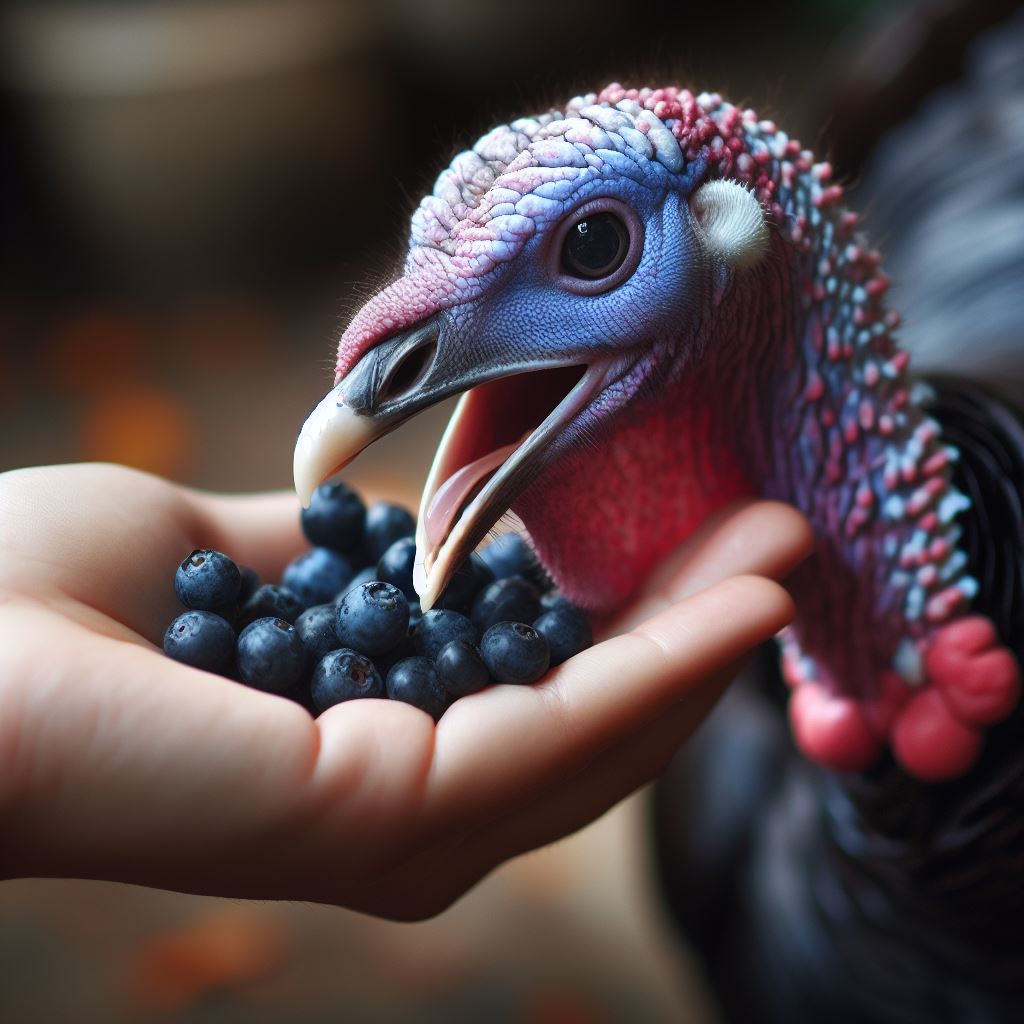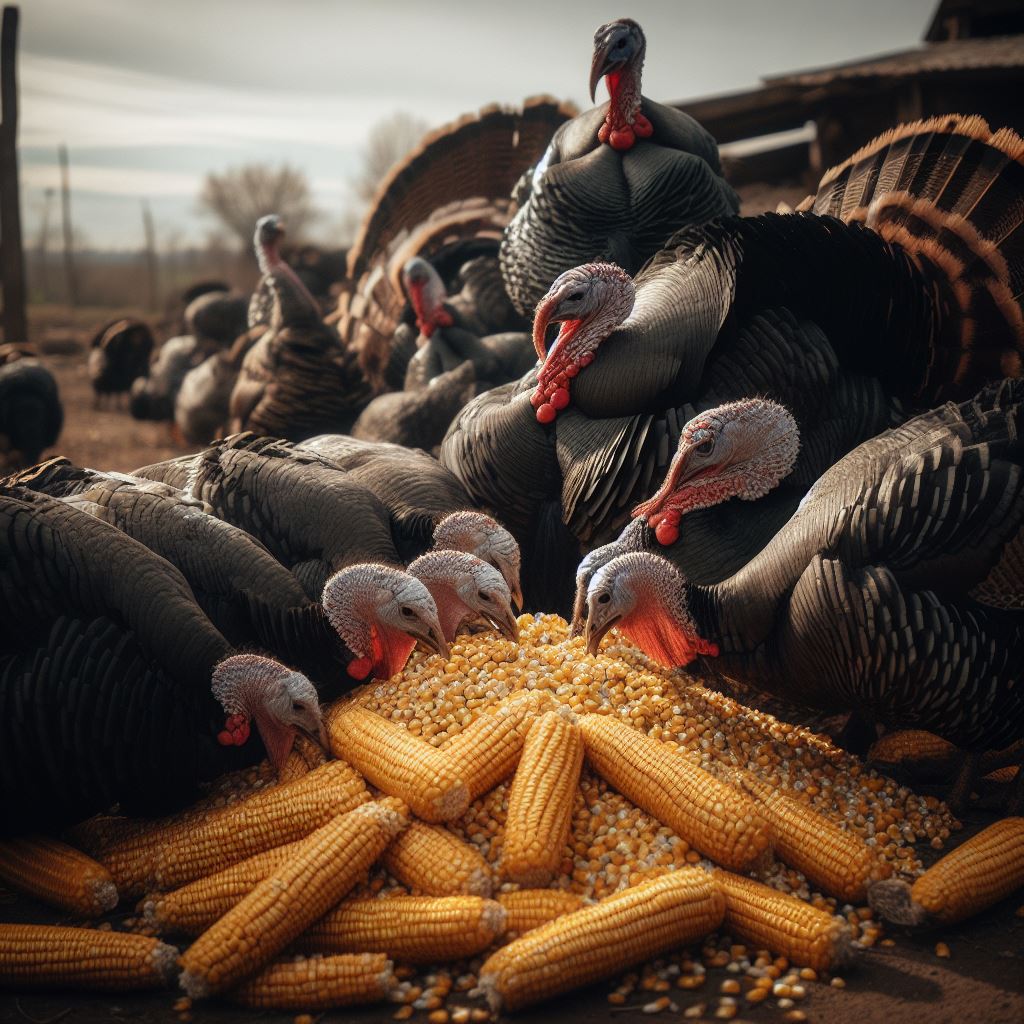Can Turkeys Eat Blueberries? Read This First!

Table of content:
As the owner of a backyard turkey flock, you want to make sure your birds stay happy and healthy. Variety is an important part of any animal’s diet, so you may be wondering if you can share some of the fruits growing in your garden. Blueberries are packed with beneficial nutrients, but can turkeys eat blueberries safely?
Domesticated turkeys are omnivores, meaning they enjoy both plant and animal matter in their diet. Their wild ancestors forage on a diverse combination of:
- Grasses
- Seeds
- Insects
- Lizards
- Snakes
- Small mammals like mice
Modern turkeys retain this flexible, opportunistic approach to eating. They thrive on commercial poultry feeds supplemented with:
- Cracked corn
- Wheat
- Oats
- Table scraps
As long as you offer an appropriate base diet, fruits and vegetables can round out the menu. But turkey keepers can’t assume all people’s foods are bird-safe. So what about blueberries?
 Are Blueberries Good or Bad for Turkeys?
Are Blueberries Good or Bad for Turkeys?
When wondering “Can I feed my turkeys blueberries?” the first concern is often toxicity. After all, some sources of food can seriously harm birds if eaten.
Nightshade fruits like tomatoes, potatoes, eggplants, and peppers can be dangerous or even deadly due to their solanine content. On the other hand, blueberry plants are not a toxicity risk for turkeys who eat the berries.
Blueberries offer some great nutritional benefits:
- Low calories
- High vitamin C
- Disease-fighting antioxidants
- Fiber for healthy digestion
So not only is it generally safe to let backyard turkeys sample blueberries, but doing so gives them health bonuses.
Possible Concerns with Feeding Blueberries
Just because blueberries aren’t toxic to turkeys doesn’t guarantee every bird can eat them without issue. Here are a few things to consider:
- Choking hazards – Whole blueberries may lodge in a turkey’s throat. Mash or chop them instead.
- Allergies – Rarely, individual birds could have bad reactions to the berries. Watch for signs of distress.
- Cyanide poisoning – In large amounts, substances in blueberries can block nutrient absorption. Feed blueberries in moderation.
- Diarrhea – Too many berries at once may cause loose droppings. Spread servings out over a week.
As long as you introduce blueberries gradually while watching for problems, most turkeys enjoy them without trouble.
How to Offer Blueberries to Backyard Turkey Flocks
Giving turkeys opportunities to engage in natural foraging behaviors promotes better bird health and welfare. Scattering blueberries across the birds’ outdoor enclosure is an easy way to encourage this.
You can also hand-feed blueberry treats to reinforce human bonds. Just follow these tips:
Blueberry Feeding Tips
- Start with just a few berries per bird so their systems can adjust.
- Mash soft berries thoroughly or chop large ones into pieces to prevent choking.
- Mix berries into commercial feed to make eating them more natural for timid turkeys.
- Refrigerate unused portions to preserve freshness and vitamin content.
- Remove uneaten berries within an hour since they can spoil in warm weather.
- Offer berries no more than once or twice a week to keep turkeys’ diets balanced.
- Watch for signs of allergic reactions or illness and stop feeding blueberries if problems develop.
With some basic precautions, blueberries can be a safe, nutritious supplement for backyard turkeys. They likely won’t eat enough to meet all their nutritional needs, but the berries make a nice change of pace from standard poultry feeds.
How Many Blueberries Can Turkeys Eat?
Commercial turkey feeds are carefully formulated to meet domesticated birds’ dietary requirements without excess calories. While the occasional treat of garden fruits or vegetables is fine, turkeys have no strict need for these people’s foods.
Blueberries in particular provide some beneficial nutrients but lots of calories relative to their small size. Overdoing berry treats leads to obesity, diabetes, heart issues and other nutrition-related diseases in captive birds.
Ideally, limit blueberries to less than 10% of a turkey’s total diet. This allows them to enjoy the berries without skewing their calorie intake.
As a general rule of thumb, the following daily blueberry rations are safe for turkeys:
- Poults under 4 weeks: No more than 2-3 berries
- Young juveniles under 16 weeks: About 1⁄4 cup berries
- Adult turkeys: Around 1⁄2 cup blueberries
These quantities allow most birds to eat their fill of berries over a week while limiting overconsumption. Adjust amounts based on your flock’s interest and whether treat time inspires aggressive behavior.
Signs Your Turkey is Eating Too Many Blueberries
Monitor how readily your flock gobbles down blueberries and how it affects their overall diet. Signs potentially overindulging birds may display include:
- Increased territorial behavior when berries appear
- Losing interest in balanced feed
- Soft or loose droppings
Backyard turkey health relies heavily on a varied, well-balanced diet. Allow blueberries and other fruits in moderation without letting them become the main attraction. Keep treats limited to reinforce turkeys’ natural foraging behaviors without supporting obesity.
The Benefits of Blueberries for Turkey’s Health
While blueberries make a nice occasional treat, some turkey keepers wonder if the berries offer any real health value. As it turns out, blueberries bring some surprising benefits to the table.
All colorful produce contains health-protecting compounds called antioxidants. Among common fruits and veggies, blueberries score very high on the antioxidant scale.
Research also suggests the plant chemicals that give blueberries their blue hue – anthocyanins – deliver extra perks. Some of these evidenced-based benefits include:
Blueberries May Provide the Following Health Benefits:
- Boost immune system function
- Reduce systemic inflammation
- Improve digestion
- Strengthen bones
- Support urinary tract health
- Aid respiratory issues
- Control blood sugar
- Inhibit tumor growth
- Enhance cognition
- Preserve vision
- Protect vascular function
These impacts stem from anthocyanins plus other blueberry nutrients like:
- Vitamin C
- Manganese
- Fiber
- Vitamin K
- Copper
While overt deficiency is uncommon in well-managed backyard turkeys, optimizing nutrition helps them avoid illness and injury. Supporting overall wellness with antioxidant-rich blueberry supplements is smart.
FAQs About Feeding Blueberries to Turkeys
For turkey enthusiasts considering offering their flock blueberry treats, several key questions often arise. Below are answers to some of the most common inquiries.
Can Wild Turkeys Eat Blueberries?
Yes, wild turkeys will eat ripe, fallen blueberries they find while foraging. Their diverse natural diets allow them to safely consume a variety of fruits, seeds, greens, nuts, berries, buds, and insects. These protein and plant sources meet all nutritional requirements.
However, wild turkeys likely eat berries opportunistically based on seasonal availability more than seeking them out as a preferred food. Their intake is also naturally limited by small scattered berry clusters.
Can Baby Turkeys Eat Blueberries?
Poults under 4 weeks old have delicate digestive systems still developing the capacity to process various foods. While tiny sampled portions of mashed blueberries won’t necessarily harm them, their undeveloped gizzard won’t break down the berries’ skins fully.
It’s smartest to wait until poults are 16+ weeks old before offering fruit. At that point, their bodies can handle blueberries fine as an occasional snack.
What Other Fruits Can Turkeys Eat Besides Blueberries?
In addition to blueberries, turkeys can enjoy apples, bananas, cranberries, currants, grapes, melons, peaches, and strawberries. Most berry varieties and citrus fruits are also safe in moderation.
Favor fruits high in vitamin C and low in acidity for best results. Introduce new offerings slowly and vigilantly monitor birds for any adverse reactions.
Can I Give My Turkeys Too Many Blueberries?
Yes, it’s possible to overfeed blueberries. Limit portions to no more than 10% of daily food intake as excessive fruit can lead to diarrhea, malnutrition, and obesity. Watch for signs of territorial behavior or disinterest in complete feeds, as this indicates blueberries are becoming a distraction.
What About Dried Blueberries?
Dehydrated blueberries make a convenient treatment option but still require vigilant monitoring. Even with less overall moisture, high sugar content poses threats if overfed including upset digestion, weight gain, kidney issues, and fatty liver disease. Introduce dried berries slowly and limit to a teaspoon per adult bird daily.
Conclusion
Can turkeys eat blueberries? As evidenced above – absolutely! These colorful berries bring excellent nutritional density without posing toxicity threats. Blueberries offer great antioxidants and inflammation-reducing properties.
Applied judiciously as part of a balanced diet, blueberries make excellent supplemental fruits. Offer them freely during regular foraging sessions or use them to reinforce positive human-bird interactions. Just avoid overfeeding them, and your turkeys can enjoy all the benefits blueberries bring to the table.
With a quality complete feed plus the opportunity to exhibit natural behaviors, a few blueberry treats here and there let turkeys round out their menu. These simple feeding tips support your flock’s health and wellbeing.
Welcome. I’m Adreena Shanum, the proud owner of this website, and I am incredibly passionate about animals, especially poultry. I founded adreenapets.com as a labor of love, stemming from my desire to share my knowledge and experiences with poultry enthusiasts worldwide.



